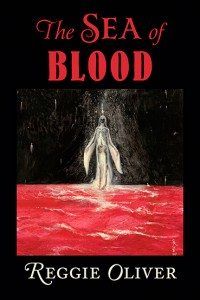
Reggie Oliver
Dark Renaissance Books
Reviewed by Michael R. Collings
It is difficult to refer to a collection of weird tales as elegant without immediately calling to mind the admittedly dated, neo-eighteenth-century prose of H.P. Lovecraft. As remarkable as his stories are (and I find them enormously appealing) and as extensive as his influence has been in contemporary horror and dark fantasy, Lovecraft has one clear disadvantage for modern readers: his language—as structured, as self-consciously elevated, as effective as it might be to his fans—simply does not speak to all.
So when I refer to Reggie Oliver’s retrospective edition of short fiction, The Sea of Blood, as elegant, I do so cautiously but meaningfully. It is tasteful—that is, every story is told in precisely the tone best suited to its effects, its themes, its purposes, and its characters. It is stylish—Oliver obviously enjoys the possibilities of prose and exploits (used as a good word) them to their fullest while never indulging in verbal effects for their own sakes. It is sophisticated—urbane, learned, even literary, but never at the expense of clarity or empathy. It is neither condescending nor snobbish—yes, there are stories about the upper-class and its affectations (particularly the serio-comic “The Blue Room”), but there are also gritty tales of starving actors and grubby (if haunted) theaters, of patronizing headmasters and students eager to learn, of ancient mysteries and modern terrors…and throughout runs a stream of elegance that makes each story inviting and enjoyable.
Most are reprints from earlier collections, although coming across them in their new context gives them a invigorating sense of freshness. I was familiar with “Baskerville’s Midgets,” for example, but in The Sea of Blood, surrounded by additional tales of actors and illusions, it took on an unexpected crispness. Others are new to this volume: “Absalom,” “The Rooms are High,” and “Trouble at Botathan,” each contributing its particular strength.
I referred to the collection initially as weird fiction—a phrase I use rarely but that here seems far more appropriate than horror. Oliver’s stories are odd, uncanny, eerie, and almost without exception end where more traditional horror might begin: with the assertion of a monster, of something inexplicable except as supernatural, of something unquestionably beyond possibilities in the world we assume is real.
Instead, he tantalizes with hints and suggestions, with unusual moments and incongruous events that might lead to true horror…or might not. One step further, beyond the limits of the story, and he would have to acknowledge that, “Yes, it was all in the character’s mind” or “No, such things can exist, even if every sense we possess denies them.” Those final, piercing moments of ambiguity, of necessary ambivalence, cap the stories in ways that definitive conclusions could not, enhancing the sense of “the fantastic” in very much the way Tzvetan Todorov described it several decades ago. If Oliver knows of Todorov’s then-groundbreaking study, he has learned his lesson well.
The Sea of Blood is fairly lengthy at nearly four-hundred pages, with twenty-three exceptional tales. It is not a collection to be skimmed but to be savored slowly, to be enjoyed as Oliver invites readers into unexceptional lives that turn out to be exceptional indeed…one way or the other.








